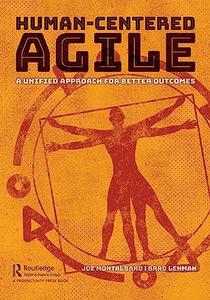
Free Download Human-Centered Agile; A Unified Approach for Better Outcomes
by Joe Montalbano
English | 2023 | ISBN: 100091562X | 272 pages | True PDF | 5.78 MB
This book is a guide on how to apply Human-Centered Design (HCD) practices to an Agile product development model that is used widely throughout industry and government, where it is applied primarily to software and technology development efforts. This has been an ongoing industry challenge due to the fact that HCD prioritizes time spent understanding the problems to be solved (time spent in the problem space), while Agile prioritizes a fast hypothesize-and-deliver model (time spent in the solution space). Organizations that attempt an Agile transformation abandon it either because it was too difficult or because it did not deliver the hoped-for results. At the same time, efforts to improve the design and experience of their products using Human-Centered Design have a tendency to fall short because it can be difficult to see the ROI of design efforts, even while companies like McKinsey document design-driven successes. What's more, a company that successfully adopts Agile often seems to have an even harder time implementing HCD and vice versa. This is particularly disappointing since Agile and HCD should be mutually supportive. In practice Agile teams often bypass HCD efforts in favor of finishing their goals and thinking they are doing well, only to have their work product fail to meet the actual end user's needs. At first the team will become indignant. "We followed the expert guidance of our Product Owner, the 'Voice of the Customer, '" they will say, followed by "but... it met all of the Acceptance Criteria, they should love it." It's a failure of Agile that this type of sub-optimal delivery happens so regularly and predictably. The fact that team responses can be so accurately predicted in advance (by those who've seen this movie many times before) point to a process failure or inefficiency that is widespread and desperately needs to be addressed. Alternatively, teams will invest too heavily in up-front discovery efforts that slow down delivery to an unacceptable point, often while also failing to capture research-based findings in a way that matures the overall strategic product or portfolio understanding. The cost of misfiring goes far beyond a bad delivery or an angry customer. Decreased team morale drives poorer future performance (cost), turnover if left unchecked (more cost), and non-productive blame sessions that lead to degraded faith in the Agile product development model itself. This book identifies solutions based on successful methods of integrating HCD practices by phase into an ongoing agile delivery model, from the Discovery through Implementation and Evaluation, including: ● Key success factors for an HCD/Agile engagement approach ● Critical points of delivery ● Strategies for integrating HCD into teams based on the existing design maturity of an organization or product team
Links are Interchangeable - Single Extraction
